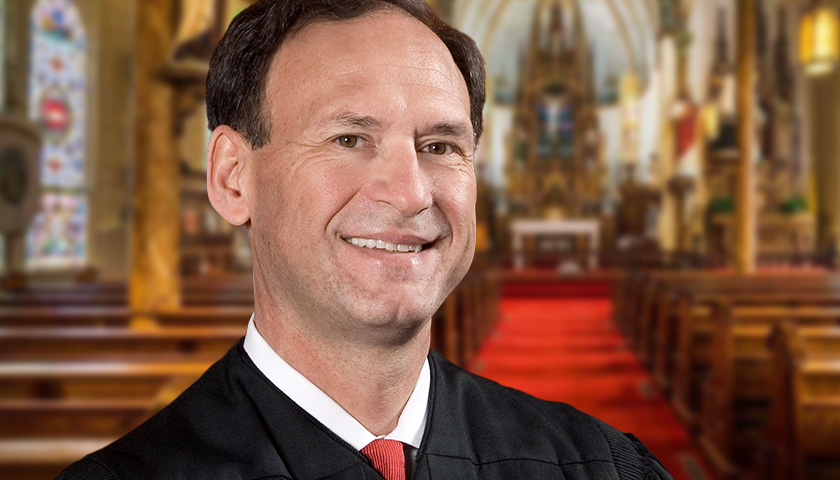by Bethany Blankley
Associate U.S. Supreme Court Justice Samuel Alito said there’s a “growing hostility to religion” in a keynote address he gave highlighting the unique protection of religion in the U.S. Constitution.
“The problem that looms is not just indifference to religion, it’s not just ignorance about religion,” he said at a 2022 Notre Dame Religious Liberty Summit in Rome last week.
“There’s also growing hostility to religion or at least the traditional religious beliefs that are contrary to the new moral code that is ascendant in some sectors,” he said during his 37-minute remarks released on Thursday.
He said he wondered “what historians may say centuries from now about the contribution of the United States to world civilization. One thing I hope they will say is that our country, after a lot of fits and starts, and ups and downs, eventually showed the world that it is possible to have a stable and successful society in which people of diverse faiths live and work together harmoniously and productively while still retaining their own beliefs. This has been truly a historic accomplishment.”
But “no human achievement is ever permanent,” he added, and “we can’t … assume that the religious liberty enjoyed today …will always endure. Religious liberty is fragile.”
“Religious liberty is under attack because it is dangerous to those who want to hold complete power,” he said.
While some academics and politicians argue religion doesn’t deserve special protection, Alito argues it does. Hostility to religion in the U.S. threatens religious liberty, which in turn threatens other fundamental rights it protects.
The First Amendment to the U.S. Constitution protects the free exercise of religion, he reiterated, which “very often involves speech, a spoken or written prayer, the recitation of Scripture, a homily, a religious book or article. These are all forms of speech. They are also forms of religious exercise.”
“If this sort of speech can be suppressed or punished, what is to stop the state from crushing other forms of expression?” he asked.
Alito pointed to attacks on the right to worship and assemble in the U.S. in an era where the Supreme Court was tasked with ruling on cases brought by pastors, priests and rabbis who faced jail time if they didn’t close their churches and synagogues because of governor-ordered lockdowns. The Supreme Court consistently ruled that orders shutting down religious worship were unconstitutional.
California Gov. Gavin Newsom and the Ninth Circuit received specific chastisement from the high court, which ruled that Newsom’s mandates prohibiting religious assembly and worship were unconstitutional. As a result, the state of California and counties were forced to settle lawsuits, paying out millions of dollars to entities they had threatened with imprisonment and exorbitant fines.
After winning several of these religious freedom cases, Liberty Counsel founder and chairman Mat Staver said, “Governor Gavin Newsom’s COVID restrictions intentionally discriminated against churches while providing preferential treatment to many secular businesses and gatherings. The Supreme Court intervened multiple times to provide relief. California may never again place discriminatory restrictions on churches and places of worship.”
Pastor Rob McCoy of Calvary Chapel-God Speak in Thousand Oaks, California, argues the government doesn’t have the authority to shut down houses of worship at all. The rulings and settlements related to cases other than his implied that if restrictions were equally imposed on secular entities and houses of worship, the case for discrimination would be moot. Religious freedom isn’t about unequal treatment between a church and Walmart, for example, he argues, because the First Amendment specifically protects the free exercise of religion, not the free exercise to shop.
McCoy told The Center Square at the time of his ongoing legal battles, during which he faced imprisonment for preaching and defying lockdowns, that more people were coming to his church because it remained open. They came, he said, “because their freedoms have been taken. Their streams of liberty dried up and they went upstream to find the source of liberty – Jesus.” Because liberty, he argues, “is not man’s idea. Liberty is God’s idea.”
Pointing to the rights protected in the First Amendment, Alito said, “We consider the relationship between freedom of speech and freedom of assembly. A religious service in a church, synagogue, mosque, or temple is a form of assembly. If a government can ban those assemblies, will it hesitate to outlaw others?”
In a society where “religious liberty is allowed,” Alito said, “it will be harder for the state to restrict other speech and other assemblies.”
– – –
Bethany Blankley is a regular contributor to The Center Square.
Photo “Samuel Alito” by Steve Petteway. Background Photo “Catholic Church” by Carol M. Highsmith.




